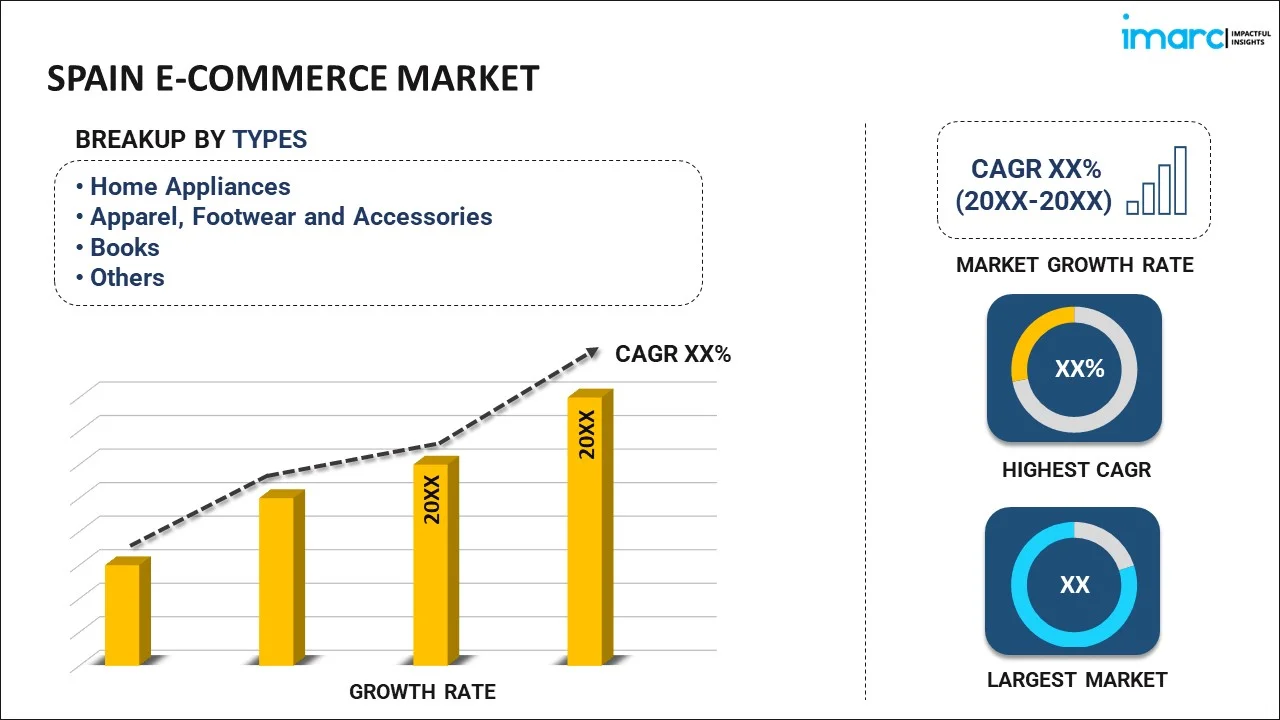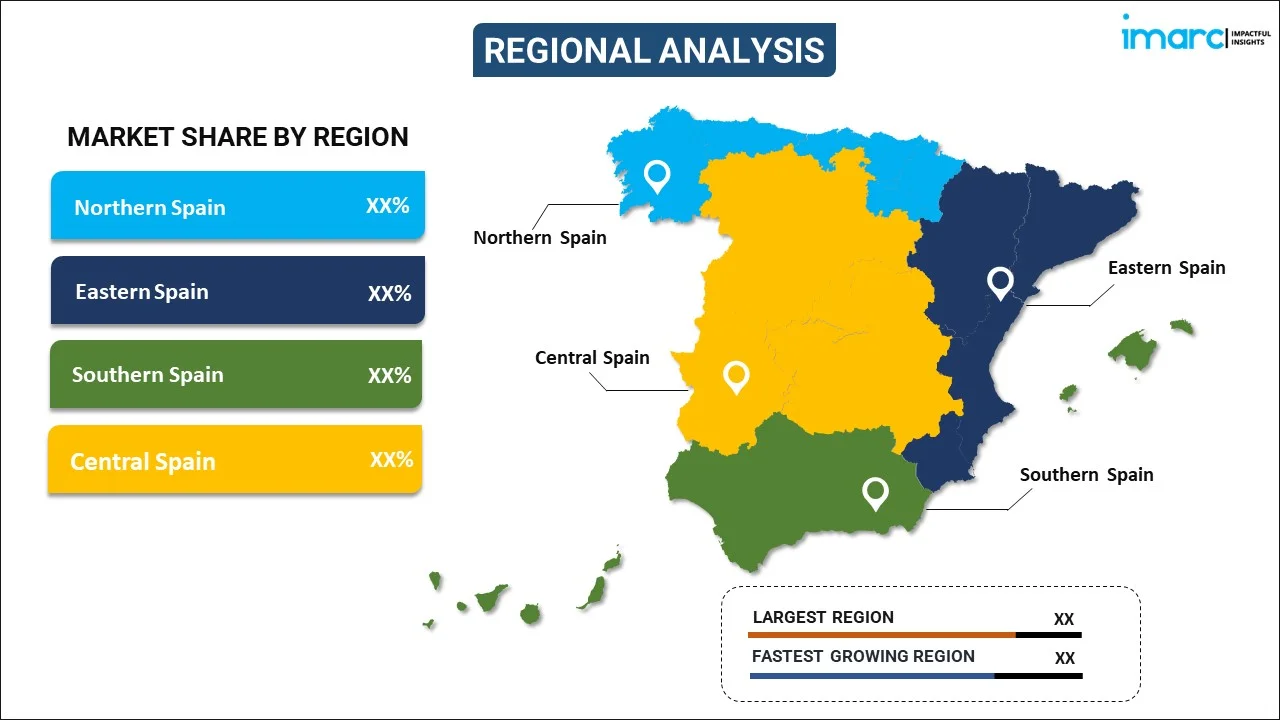
Spain E-commerce Market Report by Type (Home Appliances, Apparel, Footwear and Accessories, Books, Cosmetics, Groceries, and Others), Transaction (Business-to-Consumer, Business-to-Business, and Others), and Region 2026-2034
Spain E-commerce Market Overview:
The Spain e-commerce market size reached USD 503.3 Billion in 2025. Looking forward, IMARC Group expects the market to reach USD 1,894.0 Billion by 2034, exhibiting a growth rate (CAGR) of 15.87% during 2026-2034. The market is experiencing robust growth, fueled by increased internet penetration and consumer adoption. In addition, innovations in mobile commerce, AI, and personalized shopping experiences drive sales, thereby favoring the market. Furthermore, cross-border shopping is expanding, with sustainable practices and fast delivery options enhancing customer satisfaction and market competitiveness.
|
Report Attribute
|
Key Statistics
|
|---|---|
|
Base Year
|
2025
|
|
Forecast Years
|
2026-2034
|
|
Historical Years
|
2020-2025
|
|
Market Size in 2025
|
USD 503.3 Billion |
|
Market Forecast in 2034
|
USD 1,894.0 Billion |
| Market Growth Rate 2026-2034 | 15.87% |
Access the full market insights report Request Sample
Spain E-commerce Market Trends:
Rapid Growth in Online Shopping
Spain’s e-commerce sector witnessed a robust expansion, mainly fueled by rising internet connectivity across the country and the growing comfort of consumers with digital shopping platforms. This growth is mainly underpinned by the wide adoption of high-speed internet services and mobile devices, enabling more people to shop online with ease. For instance, in 2021, the UNICO-Banda Ancha programme allocated €250 million to provide ultrafast fixed broadband networks in rural and less populated areas. It is a continuation of the PEBA-NGA programme, which supported the rollout of next-generation broadband networks in Spain from 2013 to 2020. This initiative was co-financed by the European Regional Development Fund (ERDF). In line with this, the COVID-19 pandemic has also accelerated this trend as lockdowns and social distancing measures pushed more people to explore online shopping options. Retailers have responded why enhancing their online presence and improving ecommerce services ranging from user friendly websites to secure payment systems further enticing consumer to embrace online shopping as a convenient and reliable alternative to traditional retail.
Increasing Use of Artificial Intelligence and Machine Learning
The integration of artificial intelligence (AI) and machine learning (ML) into Spain's e-commerce platforms has significantly transformed how businesses interact with customers, manage operations, and streamline logistics. These technologies enable more personalized shopping experiences by analyzing consumer behavior and preferences to recommend products tailored to individual tastes. AI also plays a crucial role in inventory management, predicting demand trends and optimizing stock levels to reduce overheads and prevent stockouts. For instance, in April 2022, MOCAPP, an Influencer Marketing platform, launched a new technology solution for international eCommerce players. The new L!NK app uses a proprietary algorithm to anonymously scan online store customer bases, allowing businesses to identify which of their customers are active on social media and can be most effectively engaged in promotions, loyalty programs, affiliations, and sales. In logistics, ML algorithms enhance efficiency by optimizing delivery routes and managing supply chains, thus reducing delivery times and costs. Overall, the deployment of AI and ML in e-commerce not only enhances customer satisfaction but also drives operational efficiencies, making businesses more competitive in a rapidly evolving market.
Spain E-commerce Market News:
- In 2024, AliExpress secured an exclusive official global sponsorship of UEFA EURO 2024™, investing millions of Euros in discounts, deals, and engagement during the event. The platform will offer discounted prices, interactive games, and chances to win prizes, including match tickets. With its growing active consumer base, AliExpress aims to bring fans closer to the action and enhance their digital experience during the tournament.
- In 2023, Carrefour agreed to acquire 47 SuperCor stores from El Corte Inglés in Spain for 60 million euros. The stores, located in Madrid, Catalonia, Andalucia, and Comunidad Valenciana, will be rebranded as Carrefour Market, Carrefour Express, and Supeco. This move will strengthen Carrefour's presence in Spain.
Spain E-commerce Market Segmentation:
IMARC Group provides an analysis of the key trends in each segment of the market, along with forecasts at the country level for 2026-2034. Our report has categorized the market based on type and transaction.
Type Insights:

To get detailed segment analysis of this market Request Sample
- Home Appliances
- Apparel, Footwear and Accessories
- Books
- Cosmetics
- Groceries
- Others
The report has provided a detailed breakup and analysis of the market based on the type. This includes home appliances, apparel, footwear and accessories, books, cosmetics, groceries, and others.
Transaction Insights:
- Business-to-Consumer
- Business-to-Business
- Others
A detailed breakup and analysis of the market based on the transaction have also been provided in the report. This includes business-to-consumer, business-to-business, and others.
Regional Insights:

To get detailed regional analysis of this market Request Sample
- Northern Spain
- Eastern Spain
- Southern Spain
- Central Spain
The report has also provided a comprehensive analysis of all the major regional markets, which include Northern Spain, Eastern Spain, Southern Spain, and Central Spain.
Competitive Landscape:
The market research report has also provided a comprehensive analysis of the competitive landscape in the market. Competitive analysis such as market structure, key player positioning, top winning strategies, competitive dashboard, and company evaluation quadrant has been covered in the report. Also, detailed profiles of all major companies have been provided.
Spain E-Commerce Market Report Coverage:
| Report Features | Details |
|---|---|
| Base Year of the Analysis | 2025 |
| Historical Period | 2020-2025 |
| Forecast Period | 2026-2034 |
| Units | Billion USD |
| Scope of the Report | Exploration of Historical Trends and Market Outlook, Industry Catalysts and Challenges, Segment-Wise Historical and Future Market Assessment:
|
| Types Covered | Home Appliances, Apparel, Footwear and Accessories, Books, Cosmetics, Groceries, Others |
| Transactions Covered | Business-to-Consumer, Business-to-Business, Others |
| Regions Covered | Northern Spain, Eastern Spain, Southern Spain, Central Spain |
| Customization Scope | 10% Free Customization |
| Post-Sale Analyst Support | 10-12 Weeks |
| Delivery Format | PDF and Excel through Email (We can also provide the editable version of the report in PPT/Word format on special request) |
Key Questions Answered in This Report:
- How has the Spain e-commerce market performed so far and how will it perform in the coming years?
- What has been the impact of COVID-19 on the Spain e-commerce market?
- What is the breakup of the Spain e-commerce market on the basis of type?
- What is the breakup of the Spain e-commerce market on the basis of transaction?
- What are the various stages in the value chain of the Spain e-commerce market?
- What are the key driving factors and challenges in the Spain e-commerce?
- What is the structure of the Spain e-commerce market and who are the key players?
- What is the degree of competition in the Spain e-commerce market?
Key Benefits for Stakeholders:
- IMARC’s industry report offers a comprehensive quantitative analysis of various market segments, historical and current market trends, market forecasts, and dynamics of the Spain e-commerce market from 2020-2034.
- The research report provides the latest information on the market drivers, challenges, and opportunities in the Spain e-commerce market.
- Porter's five forces analysis assist stakeholders in assessing the impact of new entrants, competitive rivalry, supplier power, buyer power, and the threat of substitution. It helps stakeholders to analyze the level of competition within the Spain e-commerce industry and its attractiveness.
- Competitive landscape allows stakeholders to understand their competitive environment and provides an insight into the current positions of key players in the market.
Need more help?
- Speak to our experienced analysts for insights on the current market scenarios.
- Include additional segments and countries to customize the report as per your requirement.
- Gain an unparalleled competitive advantage in your domain by understanding how to utilize the report and positively impacting your operations and revenue.
- For further assistance, please connect with our analysts.
 Request Customization
Request Customization
 Speak to an Analyst
Speak to an Analyst
 Request Brochure
Request Brochure
 Inquire Before Buying
Inquire Before Buying




.webp)




.webp)












